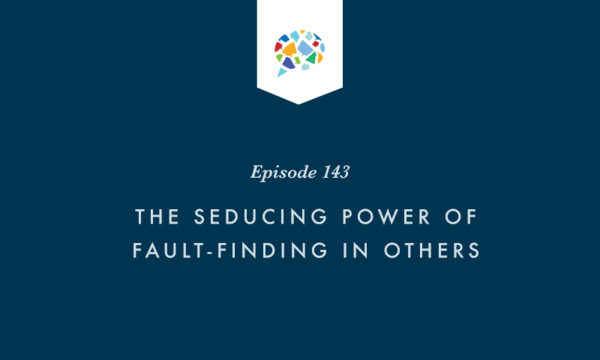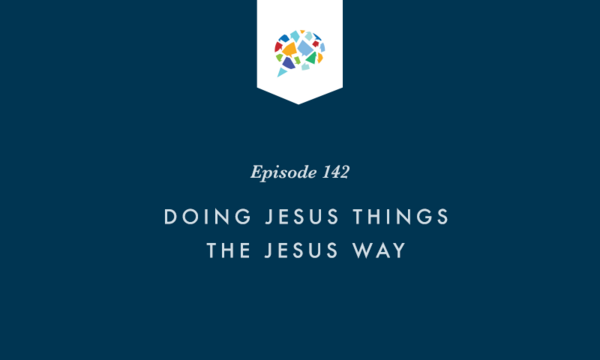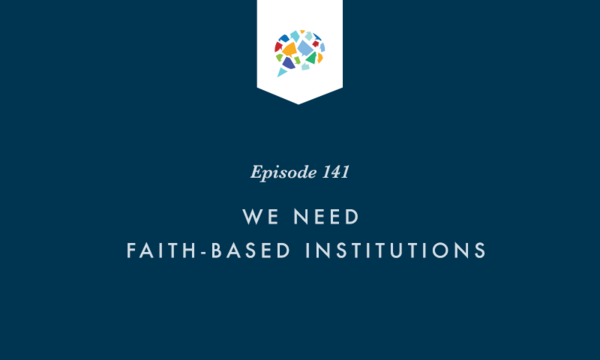
The holidays can be a meaningful time with friends and family, but gathering at the holiday table can also be trying and fraught with difficult conversations on hot-button issues. On this episode, Tim and Rick discuss how to navigate difficult conversations this holiday season in the hope of preserving relationship and deepening connection with others.
Transcript
Tim Muehlhoff: Welcome to the Winsome Conviction Podcast. My name is Tim Muehlhoff. I'm a professor of communication at Biola University in La Mirada, California. In addition to teaching classes, I get to be the co-director of this crazy idea called, The Winsome Conviction Project. We're a five year project, we're halfway through it. Trying to bring people together to talk about their differences rather than just isolate from each other. I get to do that with a good friend, Dr. Rick Langer. Rick, great to be with you.
Rick Langer: Yeah. Thanks, Tim. And we thought we'd do something quick, simple, and practical, what I've affectionately called, a field guide to Winsome conversations at the holidays. And of course this would apply to that time other than the holidays too, but we tend to think about it more. And right now as we're recording this, we're in the election day actually and are thinking ahead to what's coming down the line the next couple months. A lot of times have time with family and I have talked to a ton of people who have anxiety about having a conversation over a special meal at a Christmas party, whatever it might be in saying, "Man, these things can go south in a hurry."
Tim Muehlhoff: And just before we jump in to offer our thoughts, I just want to do a quick disclaimer. Some of you might be thinking, "It must be so easy to live with Tim and Rick, co-directors"-
Rick Langer: Somehow I doubt people are thinking, but go ahead. I'm with you, I'm working with you. I miss Tim, you just roll baby.
Tim Muehlhoff: ... of the Winsome Conviction Project. My wife and I speak at marriage conferences. I remember one, time Rick, Noreen had spent the entire weekend listening to me talk about marriage. And so, as we were leaving the conference, I took her hand and I just said, "Hey, I'm really sorry. I do like half of everything I say up there." And Noreen looked at me, she said, "Half?" So, we're going to do a disclaimer. And that disclaimer is, guys, we struggle with this just as much as you do. I remember a couple Christmases ago, Noreen had to walk outside and just look at me like, "Damn, have you lost your mind? What are you doing?" And so, I just want to say that we believe everything we say and have written, but we are with you in the trenches. This is really hard to actually be Winsome and to speak truth and love. We just want to get that out there before we offer some thoughts and we're speaking to ourselves just as much as we're speaking to anybody else.
Rick Langer: Yeah. So, what we're going to do, we're going to talk some about strategies for having conversational issue itself, but we're also going to do a separate shorter podcast as well on the spiritual side of this, "What are things that we need to do in our relationship with God? What perspectives do we cultivate theologically that might help us be able to have healthy conversations?" So, that's the two goals. Let's just begin with some thoughts about making conversations, go better at the holidays. And let me just give you one thought that hit me immediately was that for people not to feel guilty about not having a conversation at the holidays, in other words we know they have somebody have this issue with and you just feel like you, "Oh, we have to talk about it." And it's important to have conversations and to make peace with others.
But I do want to point out with most of these things, there's good times, better times, really bad times. There's any variety of times to have these conversations. And I worry when people feel, they just go, "Oh, I'd feel so guilty if I didn't talk to John about this here because I know this is an issue, whatever." And to stop and say, "Is that because you're feeling guilty? Or is that because you truly believe this is the best time for him to actually hear and understand your perspective on the issue?" And I think a lot of times when you frame it that way, you're sitting there, you suddenly have a picture of the turkey dinner or the sitting around the Christmas tree and you're like, "I know this won't be the best time for him to hear it." Then it's like, "You should probably seek another time where it might be a little bit better." So, to just give a little bit of an option for a breathing room and to not feel compelled.
Tim Muehlhoff: And there might even be a great communication theory reason for not tackling those potentially hot button topics. We talk about communication climates. Right now, it's raining outside. So, there have been times people have done live podcasts on our campus outside under the bell.
Rick Langer: In the rain.
Tim Muehlhoff: Yeah. And guess what? The climate will not allow for it right now. So, the good news about human climates, they're not like the weather. We can actually do something about it. And one of the things when we think about communication climates is positive deposits. So, if you think about your climate, and we can go into more detail in a second. But if you think, "Man, my climate is not great with this relative who's coming over, it goes south pretty quick when we talk. Well, what a great time during Thanksgiving, let's say, or Christmas, that you just focus on the positives. You speak life into that relationship. Now is not the time to offer negative critique, but rather positives. John Gottman, a person we have often mentioned on this show, says, "A healthy communication climate is really comes down to a very simple ratio. And that is five positive interactions for every one negative." And a lot of us can think of, "Man, I do the exact opposite."
Rick Langer: Yeah. It feels natural to do the exact opposite.
Tim Muehlhoff: Yeah. I mean, I do five negatives and maybe I get to the one positive. Well, got me says you need to flip that. So, guess what? In the meal half household, we have a tradition, Rick, come Thanksgiving, we watch the Detroit Lions lose.
Rick Langer: Well that's good because it's good to have consistent predictable things. You don't have to wonder what's going to happen this year. That's good. Go ahead.
Tim Muehlhoff: And then we medicate with food. That's what we do. But you know what? There's something in the misery that's kind of bonding and it's good to see people you haven't seen in a long time. So, I would say heading into this holiday, I would think about the five to one ratio. By the way, even if you're going to tackle a topic, I would still in the back of my mind be thinking as we're talking about this topic, "Am I making sure to affirm this person?" I appreciate how much you think about this issue. I appreciate all the research you've done about this issue. I love the fact that that you're not afraid to talk about these. I mean, those are all positives. And I just listed three, you've got two more before what could be perceived as a negative. So, I think Gottman is brilliant in this issue and it's a really good reminder that maybe I'm just going to take this whole holiday and do positives.
Rick Langer: Yeah, it's actually great. Almost like a slogan, "The holidays, your time for deposits." I'm going to make deposits into the relational bank account during this time and I may have to make some withdrawals over the course of the rest of the year, but let this be a season for making deposits.
Tim Muehlhoff: And if a conversation comes up, like let's say it's right there. It's been brought up and you're talking to a particular person. I think I might do something like this. "Hey, listen. We both deeply care about politics and I could talk about this all day. I don't know if this is the best place to do it, but let's do this. Let's set up a Zoom meeting in a couple weeks. Let's do this." I like that for a couple reasons. One, that probably isn't the best setting. I mean, it's just hard to control the environment, people coming and going. And somebody, that relative, they pop their head in, throw a verbal hand grenade and leave, that's probably not great. And then we're going to do another podcast about preparing for the conversations. That gives you two, three weeks to actually prepare to have that Zoom meeting.
And let me just speak from personal experience. So, I have a relative, love him to death, deeply respect him, but you could not find two people more distant when it comes to politics. So, Rick, we, during the holiday, actually tried to have the politics conversation and that's when honestly Noreen came out and just looked at me like-
Rick Langer: "What are you doing?"
Tim Muehlhoff: ... "Oh my gosh, Tim. This can't be going well." So, guess what we did? I felt really bad and I reached out to him and apologized. And then we did set up a Zoom meeting. We did it one month later and I really prayed about it, thought about it, and we both apologized to each other. And then honestly, Rick, we had a pretty good conversation because I think we both were really on guard. We were doing the five to one ratio and I think that was good. So, I like the idea of postponing the conversation till we have a better communication environment. And I just don't know if Christmas and Thanksgiving, because the stress already is heightened, that might not be the best environment to try to have those kind of conversations.
Rick Langer: So, here's another thought that comes to my mind is to come with a plan for alternative conversations or create structures. You talk about other things, not just to contested things because there's a famous saying that, "Nature of whores, a vacuum, things always get filled in." Well, if you don't have anything to talk about, people are going to drift into predictable gutters. And oftentimes these become the volatile issues. So, let me just spew out a couple of thoughts I had when I was thinking about this. The things that you could do to structure a conversation, and some of these things are the obvious ones, have people sharing things that they're thankful for from the past year. And by the way, on this, back to that issue of thinking a little bit ahead, you might want to give it a bit of structure, thankful for what someone has done for you in the past year.
Because a question like that can't be answered by saying, "I'm thankful Donald Trump is being indicted," or, "I'm thankful that the Democrats lost the house." Or what? People who are bent that way can run with Thanksgiving, no problem. But it's different to stop and think, "Wait, who is a person who's done something for me that's particularly valuable depending upon their relationship and the people are, there could be even a person here now who's done something that you've really appreciated in the past year or something." And that can give you just a tiny bit of structure that's relatively natural over a Thanksgiving or even a Christmas that doesn't have to be a Thanksgiving, but a gift a person has given you a metaphorical sort of gift that's been a blessing to you in the past year.
Tim Muehlhoff: Yeah. And I love that, Rick. And again, this is where the relative goes off road and sticks in a political comment. That's where we need to practice bracketing. So, I would bracket that. I wouldn't chastise the person in front of everybody. I would simply say, "Listen, absolutely, politics is important or theology is important, or that social issue is important, but right now let's just kind of bracket that. Let's talk about what we're thankful and not get into that. And again, we can do that later, but right now I would gently re-steer it." But we call that bracketing, which is everybody heard the comment, don't comment on the comment, just simply say, "Hey, let's shift back to what we're trying to do." And I love that. I love making it a nice tight prompt. I think it's a really good idea.
Rick Langer: Yeah. One thing we did one year, and this was, we had a group where we had a bunch of people who were adults and we had kids, probably, from age five to, probably, going off to college. So, pretty broad range in the family mix that we had at the Thanksgiving table, pretty big group. So, the thing that we did was we made a Thanksgiving plate and we gave everybody a paper plate. It had a whole bunch of magazines and you just cut out pictures that you put on your plate, kind of like a collage of things that you were grateful for, things that you loved, whatever positive things went on the plate. And then we could sit at the table, and people could share their plate, something on their plate, tell us a story. One of the things that's on your plate and it became two benefits to that.
One, is it was a thing that were enabled us to have a good long, far-reaching positive conversation. And often those bits of pictures become contagious where other people say, "Oh, I love that too," or, "I had the same experience," and you get some momentum. The other thing, it was a really fun activity to do. C.S. Lewis talks about side by sideness of friendship and there's something side by side of sitting down and doing an activity like that. And, particularly, when you have kids and parents together, it was a fun thing to do. There's a million activities like that out there, but this is one of those that helps create some conversational momentum in a positive direction.
Tim Muehlhoff: And I really like that. That's really cool because the images can be fun. It made me think about that, no doubt. If we did that in my family, some people were picking some funny images and that's just the way my kids are wired. But don't minimize the rhetorical impact of humor. So, you might want to actually set it up that way, but one time we did this, Rick, what was your most humorous family memory that you can think of growing up in East Detroit?
Rick Langer: Oh, yeah.
Tim Muehlhoff: So, Rick, my mom is not a seamstress. She has many gifts. Being a seamstress is not one of them. But she wanted to make three matching jumpers for me and my two older brothers for a Easter celebration. And she was going to get a family photograph and then she made the strategic mistake of sending us out to play before the photograph. Now, my grandfather had a compost. He did a lot of gardening.
Rick Langer: Oh, boy.
Tim Muehlhoff: We didn't know what a compost was. We saw a bunch of leaves and my older brother said to me... And again, when your older brother says do something, you do it.
Rick Langer: Sure.
Tim Muehlhoff: He said-
Rick Langer: It's always good advice.
Tim Muehlhoff: ... Jump into the leaves. So, I did. Jumped in, went up to my neck, Rick. And you know what? Ken tried to help me, my middle brother, I pulled him in. Then it was almost like the Lord spoke to us, looked to the window and there was my mom looking out the window with a knife in her hand. And we were like... My grandfather, I'll never forget this, he stripped us off me and Ken is hosing us down and he just burst out laughing. So, when we told that story, we were howling telling the story. So, maybe a prompt that invites humor because humor has such a healing effect. And I still remember doing that. That was years and years and years ago. But it really worked surprisingly well. My dad jumped in and told the story we had totally forgotten. So, maybe a prompt that will evoke humor could be a really nice prompt as well.
Rick Langer: Yeah, that's great. And it's funny, the things that worked that way. I remember being at a thank you, this was probably one of, I think we might had 35 people at this.
Tim Muehlhoff: Wow.
Rick Langer: It was a whole pile of families and stuff like that. And the people at his house were doing it, the gas oven didn't work, it cut out. And so, we had this tobacco where we're cutting things off and trying to put them in this other smaller oven and all these sorts of things. And it became entertaining to us. And this is one of those stories that we could tell again and again. And it's funny, it's interesting, it was a common bond. So anyhow, thinking of some of those kind of things, both putting off conversations that don't need to happen, but also saying, "Hey, what can do proactively to make good conversations that are either meaningful," or just as you mentioned, "Light, encouraging, fun, funny, that build a certain sense of communication, climate that might positive communication, climate that might be missing otherwise?"
Tim Muehlhoff: And if you're struggling for the humor thing, other people have done stuff. So, we're in a small group, we're in a small marriage group. And sometimes we watch movie clips that mean a lot to us. You could submit something like, think of a holiday movie that just makes you laugh. So, that could be the craziness that's happening with a Tim Allen movie or something. And then just show scenes that just make you laugh based on the holidays. That could be another way to evoke humor because what we want is we want a sense of connection and we want to try to avoid the things that would test that connection.
Now, a family can't live there perpetually. You can't keep putting away the things that divide you, that's called latent conflict and we know how devastating latent conflict is. But this is the communication climate part where build the climate up as much as possible, the strength of it. And then challenges to it can be better absorbed into the communication climate. So again, try to think of ways that this is going to be... No. Also, just realize this can all go south and it can happen. And then just be adaptable, don't throw your hands in the air and just say, "Well, then this just ticks me off." But that's going to be the spiritual preparation part that we'll eventually get to in another podcast.
Rick Langer: And let me just make a quick final note on this because we don't want to take too long, we're looking forward to the holidays.
Tim Muehlhoff: We are.
Rick Langer: And we aren't thinking you're going to be there taking a massive pile of notes for execution and all of this. But one final thought on this, there's a tendency when a person speaks to feel obliged to speak back, and that often leads to the spiral that becomes toxic. So, a couple of things that you might want to do is just to kind of recite to yourself, "Just because I heard something that doesn't need to make me speak, perhaps it could just make me think." And you could even convey that to say, "Hey, you know what you said? That really makes me think and I'm just going to have to think about it some more before I really know what I want to say about that."
And you could give us soft landing to what might have been a really harsh startup or depending on the person. And I'll let you fill in the blank because I'm sure you're thinking of some folks here that you would never want to say this to, but curiosity is often a great cure for a harsh startup and say, "Wow, I never thought about things that way. Why don't you tell me a little bit more about when you first started seeing things like that. Are there things that have particularly shaped your opinion?" And it isn't a thing that stops the conversation in this case, but a thing that shifts the direction to more personal reflection on the part of the person than antagonism towards the other side. They have to stop and think, "Yeah. Well, I guess, it was really my uncle who made me first see this or it was a teacher I had."
Tim Muehlhoff: That's good.
Rick Langer: And you begin to just shift to telling stories as opposed to having a battle. So, that's perhaps a couple of management techniques that you might keep in your hip-pocket.
Tim Muehlhoff: And keep in mind what the Proverbs say, the Proverbs have so much to say about this, and 1 Proverb I like a lot is Proverbs 19:11, "A person's wisdom yields patience." Here's the part I like. "It is to one's glory to overlook an offense." So again, you can only control yourself and maybe that uncle, aunt, relative you don't see very often says something in a very harsh way. It is to your glory to overlook that offense.
Rick Langer: That's your opportunity for glory,
Tim Muehlhoff: That's for opportunity for glory. So, hey, just Rick and I are in this all, we're in this with you. We're heading into our holidays just like you're heading into yours. And we just thought we'd reflect a little bit on ways to structure it from a communication perspective. We're going to follow this podcast up with the spiritual preparation part. Because there's one thing we've learned from the Winsome Conviction Project. We have to spiritually prepare for these types of situations. So, please check out our podcast anywhere you check out podcasts. If you want a clearing house of getting all of our resources and thoughts, please go to winsomeconviction.com and you can get archived podcast there as well. And we also have articles, we've written sermons, we've done links to those. So, please check it out winsomeconviction.com. But as always, thank you and happy holidays.
 Biola University
Biola University




